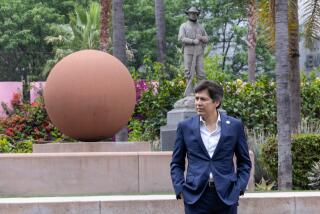A True Test of Motives
With the Rev. Martin Luther King Jr.’s birthday approaching Friday, it seems appropriate to remember some unfinished business in San Diego.
When the voters stripped King’s name from Market Street, the affair was not ended. Rather, it seemed a grievous wrong that needed to be righted promptly. The vote had overtones of racism, and we at first felt that the embarrassment could be put behind the city only if officials quickly found a suitable new tribute to the slain civil rights leader.
But the black community, which felt the hurt more deeply, in part because it followed the Sagon Penn trial and the firing of black City Manager Sylvester Murray, urged the city to move slowly.
The city wisely heeded this advice, in spite of pressure from the county Board of Supervisors and quick action by the Greater San Diego Chamber of Commerce to support a private memorial.
The chamber action was a smart move by the business community to derail a boycott. But for the city, the instinct to move quickly had to be resisted. Speedy action is part of what got the city into trouble in the first place. Many people felt that the City Council’s decision to rename Market Street had been jammed down the public’s throat. And those same people may have to be persuaded again when a new memorial is chosen.
San Diego can ill afford a repeat of the Market Street debacle, and the council’s decision to name a broad-based, 21-member commission seems designed to avoid just that.
Now it’s up to the opponents of Martin Luther King Way to affirm their claim that their motives were not racist.
As the commission holds its hearings in the next six months, we hope to hear ideas for a memorial from the Market Street initiative supporters as well as from the black community. Active participation by the greater community should produce a memorial that will defy or survive challenge.
But the pressure to find an initiative-proof memorial should not overshadow the commission’s first responsibility: to choose a tribute that is suitable to honor the Nobel Peace Prize winner. The public memorial, whether or not it is a street, should be in a well-traveled area. King deserves to be remembered by the whole community.
The chamber, with its plan to raise $750,000 for scholarships and a prominent physical memorial, perhaps a statue in Balboa Park, is moving in the right direction and has set a healthy tone for the King memorial deliberations.
The private and city committees now need to follow through with their plans and support each other’s work.
More to Read
Sign up for Essential California
The most important California stories and recommendations in your inbox every morning.
You may occasionally receive promotional content from the Los Angeles Times.









